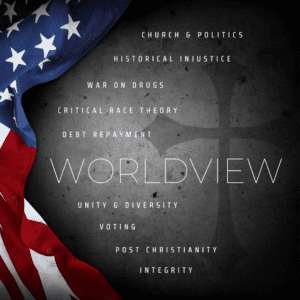In June 2021, CSA Executive Director Nikki Toyama-Szeto and CSA Founder Ron Sider took part in a 3-day Church and Politics Summit in Kenya designed to create meaningful dialogue between the Christian community and the political marketspace. (View Ron’s presentation here.) Several thousand people attended the summit as high-level church and civic leaders reflected on questions like: Should the church engage in politics? Should Christians actively advance a political agenda? and Can Christian clergy seek elective political office?
The summit was an initiative of the Kenyan Church, in conjunction with Hesabika Trust, Kenya Christians Professionals Forum, and The Catalead.
It is interesting, but not surprising, that conference attendees had quite a few questions about the church in America and its intersection with politics. Due to a lack of time, we were not able to get to all the questions. In order to continue this important conversation on the intersection of faith and politics, we chose 10 questions posed by participants and are sharing Nikki Toyama-Szeto’s short responses. We do so in an effort to help all of us think critically about how our politics influences our witness and worldview, and vice versa.
_____
 1. On financial equity: How can we reinvent Jubilee in the present age? Should Christians begin a global quest for amnesty for debt for nations unable to pay back money? Should debt relief be expanded?
1. On financial equity: How can we reinvent Jubilee in the present age? Should Christians begin a global quest for amnesty for debt for nations unable to pay back money? Should debt relief be expanded?
The principles of Jubilee provide Christian leaders an interesting framework to consider. One of the fundamental principles is a recognition of both the responsibility to pay back debts, but also the recognition that there are exploitative ways that debt can create an environment that perpetuates debt. (One example is the lending practices that end up enslaving people as they try to repay a debt.)
Specifically, to the international debt practices, I believe that amnesty for debt for nations should be considered but should not be a regular practice. It seems wrong from a Christian perspective when nations are paying disproportionate amounts to service their debt to international lending agencies while their people lack some of the services that their government could otherwise provide. A government’s responsibility should be to the citizens first. (This doesn’t get into a question of corruption, which is also a concern and would change my opinion with regards to debt repayment.) What I’m addressing is the moral question: demanding payment from governments in debt while basic services are being un-funded feels like a capitalistic system overriding the responsibility or function of a government.
2. On drugs: Drugs kill people, the war on drugs kills people. Should we then support legalization of drugs or the fight against drugs?
Christians believe that our bodies are temples where God’s Spirit dwells (1 Cor. 6:19). Therefore, we should take care of the bodies that God has given us. This would inform my concerns about both non-medical drugs (recreational drug use) and legalized substances. The legalization question is one that needs to be wrestled with in the local context as there are many cultural and social implications. One thing that is for certain flawed is the way the “war on drugs” in the United States disproportionately has penalized specific racial groups (most notably the African-American community). The disproportionate legal action against the African-American community is well documented, and it’s the abuse of the “war on drug” mandate that causes me some hesitation for fear it might be a cover for legitimating (whether accidentally or intentionally) increased incarceration of a vulnerable community.
3. On critical race theory: What is the Christian response to critical race theory, especially as a vehicle for unity and oneness in the church?
Critical race theory (CRT) is a framework that helps the community to understand both legal and a systemic manifestation of racism. Like many tools of analysis, there is much for Christians to learn in order to help us understand the realities of the world around us. Like other tools, there are places where the purposes of the tool deviates from the Christian priorities.
However, I’m deeply saddened by how politicized this tool has become. Unity or “oneness” that doesn’t examine history (or doesn’t acknowledge past wrongs done) is a thin unity—perhaps one in picture only. The unity and oneness that God calls for is a unity in Christ. The church is called to the restoration of right relationship (right relationship with God, with self, with others, and with God’s created world). CRT can help unearth some of the places where relationships have been broken and where, in Jesus, they can be made right.
4. On expanding & understanding our worldview: If part of understanding a biblical approach to politics is critically examining other worldviews, how do Christians do so in a way that is both an honest exploration and based in fact?
Empathetic listening, or entering into a story from another’s point of view, is a great way to explore. We should always be asking, “What can I learn about people who have _______ worldview?”
Personally, I have sought out experiences of displacement. Perhaps this means entering into a situation where I’m not in the majority, or choosing to enter into a story that is very different from my own. These experiences of displacement have helped me to understand some of the assumptions that I bring. To be honest, this has enriched my own faith.
For example, I feel challenged to find that in the Muslim context, the spiritual leaders are chosen in a way that is very different from what I am familiar with. In my U.S. context, Christian pastors are usually required to have a Master in Divinity. And while most may have the education, many may not have the gifting or the interpersonal skills that also make for an effective pastor. These new experiences challenge me to think about the requirements we’ve put on our church leaders that may reflect our social values more than the spiritual qualifications.
5. On church & politics: What is the role of the church in politics? Through prayer, activism, advocacy, participation? A combination?
The role of the church in politics covers all those listed—prayer, activism, advocacy, and participation. The question is: How is God working in the church community and in the church members?
There are two additional things I hope the church would do. First, that the church would put accountability in place so that it doesn’t over-identify with one political party, but rather works to re-enforce its commitment to Jesus (at times it will be in line with or against different political parties). Second, that the church would provide a place for people of many political persuasions to wrestle with how their faith informs all areas of their lives, including their political presence, actions, and convictions.
6. On historical injustice: How are issues of historical injustice (like land being taken from Native Americans and the slavery of Black people) best addressed? How do we simultaneously look at past, present, and future?
What’s important is that the past, present, and future are looked at. It is particularly important to do a good dive into history. What happened, and why? How is the impact of this history continuing to play out today? Some of the answers to this inform how we respond today.
Then, we must ask, How do we break these cycles and set out towards a different future? For example, it’s important for those in the United States to understand on whose land their churches are currently meeting. There is a live conversation in the United States about responding to the legacy of slavery. I particularly like Georgetown University’s approach in which the community looked deeply at the history of their school, and their own complicity in enslaving people. They also identified ways to make that history visible, and as a result have made several recommendations for economic restitution to be made to those who descended from the enslaved peoples. Their process is informed by their Christian (Catholic) faith and provides many helpful practices for other communities asking the same question.
7. On voting: When we make a decision on who to vote for, do we begin with the individual running and their beliefs, or do we start with the ideologies of the political party that person ascribes to?
I would ask multiple Christians in your context how they approach this. For me, I look at the individual—their values and their beliefs, but also their character. I am also informed by what they say are their policy priorities (usually this reflects the priorities of the party). Additionally, I ask whether this person has actions that back up their commitment to these policies. In all this, while I look at my interests, I also try to take on the point of view of people who have less power than I have, and I ask the questions of who will govern best with the vulnerable in mind.
8. On post-Christianity: Post-Christianity is real in America. How do we continue to look to Scripture and Jesus as our model for addressing major issues in our country without leaning towards liberalism?
Having both a high view of scripture and increased scriptural engagement are core anchors. Christians should not fear asking tough questions or interrogating the motives or perspectives of people in the past. The current movement of interrogating “colonized theologies” is fruitful, but we shouldn’t stop with criticism. Where are the generative places where our understanding of God is being strengthened, particularly among those who have historically been left out of these conversations (due to access, language, literacy issues, etc.)?
The reality of post-Christianity in America should be a response of humility. There may be a renewing of the faith as Christianity learns not to operate from the center of power but rather from a de-centered place. This may ultimately be fruitful for the church. I will also note that as I look at places that are truly post-Christian, I don’t see the U.S. as moving as far along in that place as I do in other places. The reality of the embedded practices of the Christian faith in the culture is still very strong.
9. On unity & diversity in politics: How do Christian Republicans and Democrats come together as the body of Christ, especially when they disagree on very important matters?
As Christians, we are called to a unity in Christ that is deeper than agreement. This opens the door for Republicans and Democrats to come together. My sense is that many Christians have a similar set of values, but the order of importance of those might be different. Or the expression of the path to get to that might be different. There are also genuine and deeply felt differences.
But the Christian whose identity is in Jesus should have the ability to generously enter into the “other’s” perspective, knowing that the other is also an image-bearer of God—and that perhaps there is something that God would say through an entirely different perspective. Unless one can govern a community that has identical beliefs and is of the same party, the pastoral call of politicians to care for their full “flock” would be served by the ability to enter into these conversations across deep difference.
10. On keeping integrity in politics: I lived in the U.S. for some time, and I noticed that many honest Christians were not elected to public office. How can honest Christians find ways to influence culture and engage in politics without compromise?
The challenge for Christians in politics is the same as the challenge for Christians in any space where there are elements that compete for the Christian’s time, heart, and dreams. Christians who want to influence without compromise can do two things to begin:
- Identify a community of Christians who will journey with you, speak truth to you, and with whom you can share the elements that you want accountability for.
- Identify a few trusted Christian advisers with whom you meet regularly and who you invite.
One of the elements that we have seen lately is the public (moral) failure of many high-profile pastors and evangelists. One of the people who was involved in leading an exploration into one of these cases commented to me that “accountability and transparency” are two things that are utterly needed for Christian leaders with power and influence.
We are not God. Elements that introduce accountability and transparency would help. The transparency is tricky because as politicians and high-level leaders, the issues are complex, and discretion is key. Helping to navigate appropriate transparency with discretion (when appropriate) is important, but having a community where one can have full transparency is absolutely critical.
Nikki Toyama-Szeto is CSA’s executive director.


